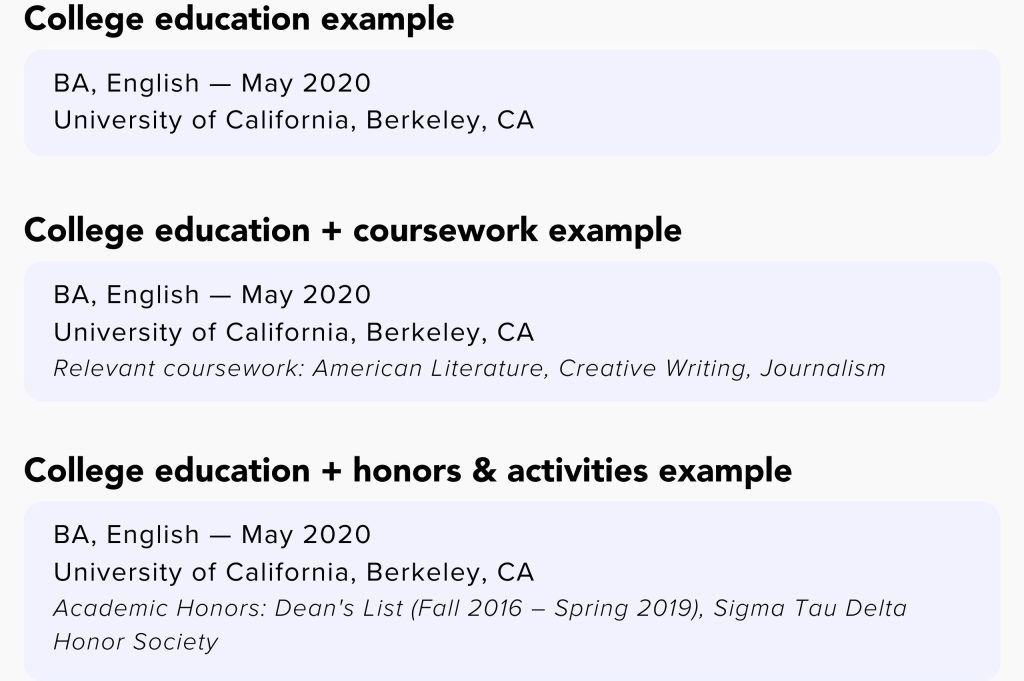Your resume is one of the most important documents you will ever create. It’s a key factor in whether or not you’ll get an interview, and it’s essential to crafting a professional image. It’s no wonder that people spend so much time agonizing over every little detail from font choice to length. But there’s one section of the resume that often gets overlooked: the education section.
Where to put the education section on your resume
When it comes to formatting your education section, there are two schools of thought.
- The first is to list your education information after your work experience. This is standard, particularly if you have years of professional experience under your belt. Since employers generally look at job experience over your degrees, this is a good way to keep it front and center.
- The second is to place your education information above your work experience. This is the typical course of action if you’re a recent graduate or don’t have very much professional experience yet.
There’s no right or wrong here, so it’s important to evaluate your unique career situation and decide accordingly.
Say you’ve been working for years but decide it’s time for a career change. You go back to school and get a degree relevant to the new field you want to go into. In this case, you want to showcase your new knowledge, so you put your education first, even though you have a decade of work experience.
Use your best judgment to determine which makes the most sense for your situation.
How to list education on a resume
In general, when listing your education on your resume, always start with your most recent degree or education in progress and work your way back. What, exactly, you include in your resume education section will depend on what level of education you’ve completed.
How to list your college degree on a resume
There are three things you should always include in your education section when listing college degrees:
- The name and location of your school
- Your degree and concentration, if applicable
- Your graduation date (or expected graduation date, if you’re still in school)
For those who have several years of work experience under their belt, it probably isn’t necessary to include details of your college experience like coursework or activities.
However, for those who are fresh out of college and don’t have much professional experience, elaborating on your college accomplishments can be a great way to beef up your resume. Activities and honors, for instance, can show that you’re well-rounded. Coursework can demonstrate areas of expertise and skills outside of what employers would expect. Of course, you’ll only want to include courses that are relevant for the job you’re applying for. No need to list your Cinema 101 class if you’re applying for a mechanical engineering job!
RELATED: Tell Me About Yourself: How to Tell Your Story in an Interview

How to list some college experience on your resume
If you attended college— even if you didn’t graduate— it’s worth mentioning!
You’ll format it much like we demonstrated above, but note the years that you attended. You can even note the degree you were working towards, if relevant.

If you didn’t earn a college degree, it’s a good idea to also list your high school education or equivalent degree.
RELATED: 7 Zoom Interview Tips to Help You Get the Job
Should I put my high school on my resume?
If high school is the highest level of education you’ve obtained, you can note it by including the high school name, city and state, and graduation year. Otherwise, you can omit it.
It may look something like this:

Perhaps you obtained your GED or other high school diploma equivalent. You can note this achievement along with the high school that you did attend.

Should I put my GPA on my resume?
Ah, the age-old decision to include your GPA or not on your resume.
You’ll hear different answers to this question depending on who you ask because there simply isn’t one straightforward answer.
In most cases, it is not necessary to include your GPA on your resume— unless an employer specifically asks for it.
However, if you are a recent graduate and have little or no work experience, then you may want to list your GPA (as long as it is good) to demonstrate that you are qualified for the position. Alternatively, if you are applying for a job in a field that is unrelated to your degree, then you may choose not to list your GPA.
RELATED: How Many References Should You Have?

Expert words of advice
“Including your GPA really depends on the role you’re looking for, your actual grade point average, and the employer you’re interviewing with.
If an employer asks for it, regardless of what your GPA is, you need to include it.
However, if they don’t ask for it, only list it if it is a stellar GPA, which would probably be a 3.7 or higher. Otherwise, it’s not expected that you include it.
—Kelli Mason, JobSage Co-Founder
The bottom line
Your resume education section doesn’t have to be something to sweat over. Just remember to tailor your resume education section (and the rest of your resume) to each individual job application so that potential employers can see why you’re the perfect candidate for the position at hand.
